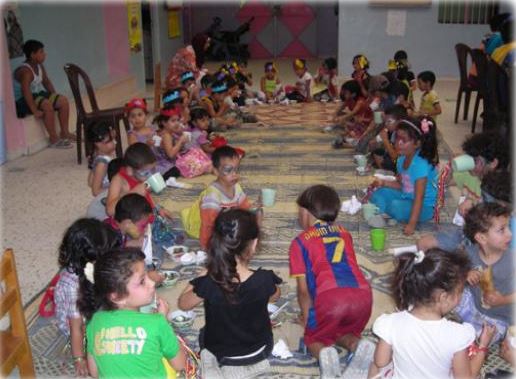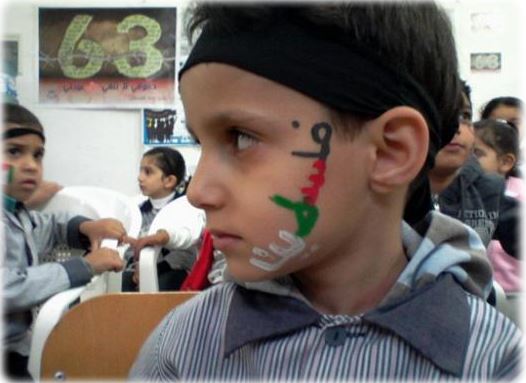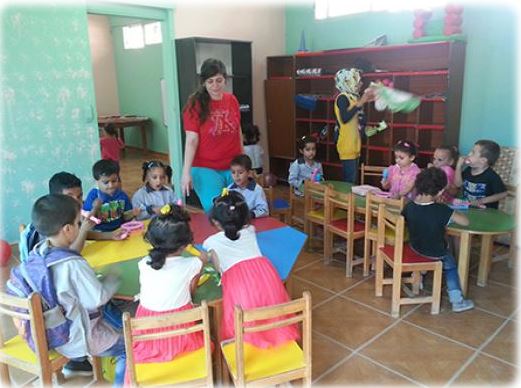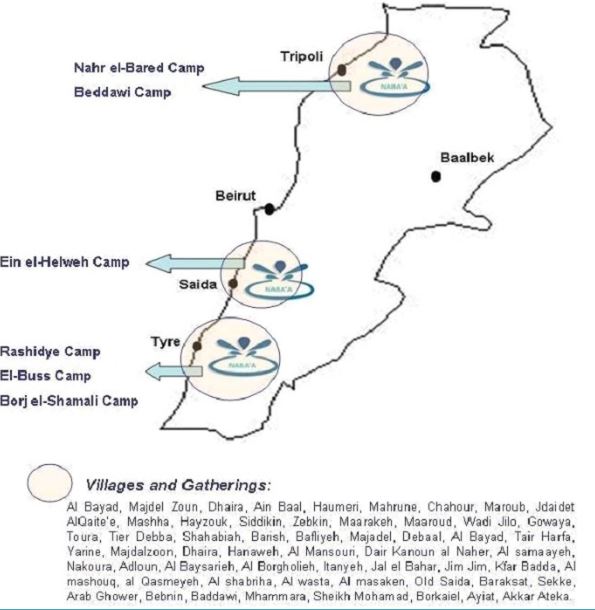Nabaa in Lebanon – the best answer to poverty and marginalization is EDUCATION.
By
Milena Rampoldi, ProMosaik. In the following my interview with Qassem Saad of
the Organisation Nabaa in Lebanon. Nabaa
helps the most impoverished and marginalized children in the country, and also
supports Palestinian and Syrian refugees coming to Lebanon. Local Communities
need support to empower girls, and women, and to support children to build up a better future for the Middle
East. I would like to thank Qassem for his detailed answer to our questions.
And the best answer to poverty and marginalization is EDUCATION.
Milena Rampoldi, ProMosaik. In the following my interview with Qassem Saad of
the Organisation Nabaa in Lebanon. Nabaa
helps the most impoverished and marginalized children in the country, and also
supports Palestinian and Syrian refugees coming to Lebanon. Local Communities
need support to empower girls, and women, and to support children to build up a better future for the Middle
East. I would like to thank Qassem for his detailed answer to our questions.
And the best answer to poverty and marginalization is EDUCATION.

Milena
Rampoldi: What are the main objectives of Nabaa?
Rampoldi: What are the main objectives of Nabaa?
Qassem Saad: Developmental
Action without Borders/Naba’a Aims for a community in which all marginalized
groups (children, adolescents, women, etc.) are fully included as equal members
of society and are able to achieve their full potential. Naba’a
applies a holistic approach in its strategy and program implementation by
targeting several groups such as children aged 0-18, parents, teachers and the
community as a whole, as well as NGOs and governmental agencies. Over the last
10 years, Naba’a has worked hard to develop its capacities and expand its
experiences, particularly in the fields of children’s rights and community
development. Naba’a strongly believes that sustainability cannot be achieved
without continuous strengthening and improvement of the organization. Our Main Specific Objectives are;
Action without Borders/Naba’a Aims for a community in which all marginalized
groups (children, adolescents, women, etc.) are fully included as equal members
of society and are able to achieve their full potential. Naba’a
applies a holistic approach in its strategy and program implementation by
targeting several groups such as children aged 0-18, parents, teachers and the
community as a whole, as well as NGOs and governmental agencies. Over the last
10 years, Naba’a has worked hard to develop its capacities and expand its
experiences, particularly in the fields of children’s rights and community
development. Naba’a strongly believes that sustainability cannot be achieved
without continuous strengthening and improvement of the organization. Our Main Specific Objectives are;
–
Support young
children most at risk of violence and neglect in their communities and to
provide them with opportunities to develop their confidence and to grow up in a
safer, more inclusive environment.
Support young
children most at risk of violence and neglect in their communities and to
provide them with opportunities to develop their confidence and to grow up in a
safer, more inclusive environment.
–
Support
children and youth at risk of dropping out from school and living in hazardous circumstances
and to help them realise their potential.
We particularly focus on marginalized girls, who have restricted
mobility and are being denied education, or are entering into early marriages.
Support
children and youth at risk of dropping out from school and living in hazardous circumstances
and to help them realise their potential.
We particularly focus on marginalized girls, who have restricted
mobility and are being denied education, or are entering into early marriages.
–
Build the
capacity of local communities to take a more coordinated and inclusive approach
to participatory decision-making and service provision. We particularly
focus on strengthening women’s role in the community so that they are able to
participate more fully in community decision making
Build the
capacity of local communities to take a more coordinated and inclusive approach
to participatory decision-making and service provision. We particularly
focus on strengthening women’s role in the community so that they are able to
participate more fully in community decision making
–
Influence the
decisions of key policy makers and service providers who are responsible
towards the Palestinian communities living in Lebanon to uphold the rights of
Palestinian children, and to be accountable for providing appropriate services.
Influence the
decisions of key policy makers and service providers who are responsible
towards the Palestinian communities living in Lebanon to uphold the rights of
Palestinian children, and to be accountable for providing appropriate services.

Which
are the main problems children face in your country?
are the main problems children face in your country?
–
Children and young people described the
pressures they are being subject to at school and in their community. At the top of that list was their exposure to
various forms of violence and abuse, including bullying by peers (especially
experienced by refugee children from Syria).
Children and young people described the
pressures they are being subject to at school and in their community. At the top of that list was their exposure to
various forms of violence and abuse, including bullying by peers (especially
experienced by refugee children from Syria).
–
Children in schools were deterred by the
physical environment – small places for recreational activities, badly
maintained toilets and poor ventilation in classrooms – as well as the burden
of the curriculum, and the teachers’ several violent practices.
Children in schools were deterred by the
physical environment – small places for recreational activities, badly
maintained toilets and poor ventilation in classrooms – as well as the burden
of the curriculum, and the teachers’ several violent practices.
–
Refugee children from Syria experienced
much discrimination, from peers and from teachers, and struggled to keep up
with a curriculum that is mainly taught in English.
Refugee children from Syria experienced
much discrimination, from peers and from teachers, and struggled to keep up
with a curriculum that is mainly taught in English.
–
Parental neglect and the low level of
parents’ awareness of how to manage their children’s behavior how to identify
risk factors, and how to protect their children from abuse or exploitation.
Parental neglect and the low level of
parents’ awareness of how to manage their children’s behavior how to identify
risk factors, and how to protect their children from abuse or exploitation.
–
Young people experienced stress due to
the need to find a gainful employment or any income-generating opportunity.
Young people experienced stress due to
the need to find a gainful employment or any income-generating opportunity.
–
Conflict and unsecure situation lead the
parents and their children to live in an additional psychosocial pressures and
stress.
Conflict and unsecure situation lead the
parents and their children to live in an additional psychosocial pressures and
stress.
Why
is education the basis of the development of all societies?
is education the basis of the development of all societies?
We all agree that all children
have the right to an education. But investing in education is also the smart
thing to do. Why? Because education gives people the skills they need to help
themselves out of poverty and into prosperity.
have the right to an education. But investing in education is also the smart
thing to do. Why? Because education gives people the skills they need to help
themselves out of poverty and into prosperity.
–
Improved Health: With education, people are
better prepared to prevent disease and to use health services effectively.
Educated mothers have healthier children.
Improved Health: With education, people are
better prepared to prevent disease and to use health services effectively.
Educated mothers have healthier children.
–
Economic Growth; The facts and the results
show that youth who have a higher level of education are in better economically
than others, while those who dropped out of schools at the primary levels are
either unemployed, working part time, or categorized as hardship cases by
UNRWA.
Economic Growth; The facts and the results
show that youth who have a higher level of education are in better economically
than others, while those who dropped out of schools at the primary levels are
either unemployed, working part time, or categorized as hardship cases by
UNRWA.
–
Educated people and social media people have more opportunities to
keep themselves updated regarding the job opportunities, where most of the
advertised opportunities are electronically published and communicated.
Educated people and social media people have more opportunities to
keep themselves updated regarding the job opportunities, where most of the
advertised opportunities are electronically published and communicated.
–
Democracy and political stability: Education supports the
growth of civil society, democracy, and political stability, allowing people to
learn about their rights and acquire the skills and knowledge necessary to
exercise them.
Democracy and political stability: Education supports the
growth of civil society, democracy, and political stability, allowing people to
learn about their rights and acquire the skills and knowledge necessary to
exercise them.
–
Education protecting children particularly girls,
from being abused, neglected or exploited by adults, parties and groups.
Education protecting children particularly girls,
from being abused, neglected or exploited by adults, parties and groups.

Which
are the main things you do for community development?
are the main things you do for community development?
–
Naba’a believes that such development
involves helping to build better communities that are based on justice, equity,
mutual respect and sustainable partnership development. It seeks to enable
individuals and communities to grow and change according to their own needs and
priorities, and at their own space, provided this does not oppress other groups
and communities, or damage the environment. The community development process
depends greatly on building the capacities of the people in the community, so as
to enable them to use the resources wisely and effectively.
Naba’a believes that such development
involves helping to build better communities that are based on justice, equity,
mutual respect and sustainable partnership development. It seeks to enable
individuals and communities to grow and change according to their own needs and
priorities, and at their own space, provided this does not oppress other groups
and communities, or damage the environment. The community development process
depends greatly on building the capacities of the people in the community, so as
to enable them to use the resources wisely and effectively.
–
Community development is the process that
positively changes the living conditions in which aspects will contribute to
the of community’s well-being
(economic, social, environmental and cultural), whereby community members
cooperate together in playing effective, positive roles in collective action that
generates solutions to common problems.
Community development is the process that
positively changes the living conditions in which aspects will contribute to
the of community’s well-being
(economic, social, environmental and cultural), whereby community members
cooperate together in playing effective, positive roles in collective action that
generates solutions to common problems.
–
From
our viewpoint we see the community as benefitting locally from available
resources to achieve the goals and aspirations of its members.
From
our viewpoint we see the community as benefitting locally from available
resources to achieve the goals and aspirations of its members.
–
We
endeavor through the community program to penetrate community life, so that any event
requiring intervention for the social development of target groups, we can
employ psychology, education, and economics to stimulate and mobilize
activities and programs for maximum effectiveness.
We
endeavor through the community program to penetrate community life, so that any event
requiring intervention for the social development of target groups, we can
employ psychology, education, and economics to stimulate and mobilize
activities and programs for maximum effectiveness.

How
important is it to involve parents in your work?
important is it to involve parents in your work?
–
Naba’a
applies a holistic approach in its strategy and program implementation by
targeting several groups such as children aged 0-18, parents, teachers and the
community as a whole, as well as NGOs and governmental agencies. We work in an integrated way,
involving a wide range of individuals and organizations within the community to
build a shared approach to achieving our vision, mission and aims. Through our
programs and interventions, we recognized that children
are more likely to succeed socially, psychologically and academically as
opposed to engagement in violent behavior if their families are involved in
their education.
Naba’a
applies a holistic approach in its strategy and program implementation by
targeting several groups such as children aged 0-18, parents, teachers and the
community as a whole, as well as NGOs and governmental agencies. We work in an integrated way,
involving a wide range of individuals and organizations within the community to
build a shared approach to achieving our vision, mission and aims. Through our
programs and interventions, we recognized that children
are more likely to succeed socially, psychologically and academically as
opposed to engagement in violent behavior if their families are involved in
their education.
–
Implementing
activities with parents, gives them opportunity to bridge the gap with their
children.
Implementing
activities with parents, gives them opportunity to bridge the gap with their
children.
–
It
will enhance the trust among them and promote positive parenting in dealing
with the problems of their children and adolescents.
It
will enhance the trust among them and promote positive parenting in dealing
with the problems of their children and adolescents.
–
Finally,
working with the children without engaging their parents or community will lead
to very little positive change because most of the children’s time is spent with
their parents and within the community.
Finally,
working with the children without engaging their parents or community will lead
to very little positive change because most of the children’s time is spent with
their parents and within the community.
Tell
us about the success and the challenges of your work.
us about the success and the challenges of your work.
The
main success and impact outlined in terms of achievements, quality and
diversity of programs.
main success and impact outlined in terms of achievements, quality and
diversity of programs.
–
We
have seen a lot of growth in terms of covering more children and communities
through our program and initiatives.
We
have seen a lot of growth in terms of covering more children and communities
through our program and initiatives.
–
We
are proud of the quick response by Naba’a to the emergency situation created by
faced refugee displacement from Syria to Lebanon.
We
are proud of the quick response by Naba’a to the emergency situation created by
faced refugee displacement from Syria to Lebanon.
–
Naba’a
is certified by Core Humanitarian Standards with regards to the accountability
and quality of services.
Naba’a
is certified by Core Humanitarian Standards with regards to the accountability
and quality of services.
–
Naba’a
is Leading a Child Rights Network “Manara” in 9 Arab Countries in the region.
Naba’a
is Leading a Child Rights Network “Manara” in 9 Arab Countries in the region.
–
During
the past year We reached 18150 children, 9800 young people, 5900 parents and 2750
women through our programs during 2015 till mid of 2016. To ensure our projects
deliver a sustainable impact on the lives of the most marginalized groups,
Naba’a works not only directly with children but also strengthens the capacity
of those influencing their lives. We enable parents and caregivers, teachers,
social workers, and local authorities to fulfill their responsibilities towards
children, positively interact with them and give them the support they need to
develop their full potential. In 2015, 18300 adults participated in
awareness-raising activities, workshops on child rights, positive parenting,
child protection, reproductive health, conflict transformation, youth led
initiatives, children participation, importance of education for children and
young persons, child rights governance and complaint mechanisms.
During
the past year We reached 18150 children, 9800 young people, 5900 parents and 2750
women through our programs during 2015 till mid of 2016. To ensure our projects
deliver a sustainable impact on the lives of the most marginalized groups,
Naba’a works not only directly with children but also strengthens the capacity
of those influencing their lives. We enable parents and caregivers, teachers,
social workers, and local authorities to fulfill their responsibilities towards
children, positively interact with them and give them the support they need to
develop their full potential. In 2015, 18300 adults participated in
awareness-raising activities, workshops on child rights, positive parenting,
child protection, reproductive health, conflict transformation, youth led
initiatives, children participation, importance of education for children and
young persons, child rights governance and complaint mechanisms.
Challenges;
–
The
unstable security situation in Lebanon and in the refugee locations.
The
unstable security situation in Lebanon and in the refugee locations.
–
Limited
funds which prevent implementation of long term projects, so you it is difficult
sometimes to measure the impact of our intervention.
Limited
funds which prevent implementation of long term projects, so you it is difficult
sometimes to measure the impact of our intervention.
–
The
Number of the international NGOs, who pay higher salaries than LNGOs, thereby
resulting regular staff turnovers.
The
Number of the international NGOs, who pay higher salaries than LNGOs, thereby
resulting regular staff turnovers.
What
is your dream for the future of Lebanese children?
is your dream for the future of Lebanese children?
For
the future of Lebanese children, we have a lot of dreams or suggestions;
the future of Lebanese children, we have a lot of dreams or suggestions;
–
The
law of “Education is obligatory for all” is activated and practiced in all
Lebanese areas and locations
The
law of “Education is obligatory for all” is activated and practiced in all
Lebanese areas and locations
–
The
most marginalized and impoverished children are protected from being abused by others.
The
most marginalized and impoverished children are protected from being abused by others.
–
The
most marginalized children are protected from risky behaviour such as drugs,
etc…
The
most marginalized children are protected from risky behaviour such as drugs,
etc…
–
All
work on the well being of the children living in very poor areas and being neglected.
All
work on the well being of the children living in very poor areas and being neglected.



